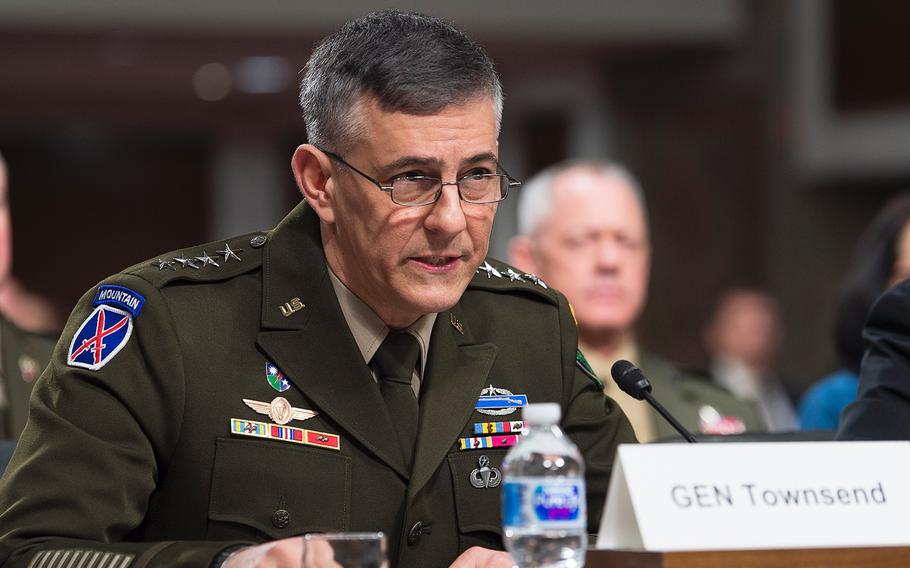
Gen. Stephen Townsend, commander of the U.S. Africa Command, testifies during a Senate Armed Services Committee hearing Thursday, Jan. 30, 2020, on Capitol Hill in Washington. (Carlos Bongioanni/Stars and Stripes)
WASHINGTON — The top commander of American forces in Africa said Thursday that he has launched a security review of all bases housing U.S. troops on the continent in the wake of an attack on a Kenyan military post that left three Americans dead.
“We were not as prepared there at Manda Bay [Airfield] as we needed to be,” Army Gen. Stephen Townsend of U.S. Africa Command said of the attack on the coastal military installations just south of Kenya’s border with Somalia. “Al-Shabab managed to penetrate onto that airfield. They were able to get access, kill three Americans and destroy six aircraft. We are digging into that to find out why that is the case.”
The surprise attack Jan. 5 by the al-Qaida-aligned Somali terrorist group left Army Spc. Henry Mayfield Jr. and U.S. contractors Dustin Harrison and Bruce Triplett dead. Townsend told the Senate Armed Services Committee on Thursday that an investigation into the incident was ongoing, but it was clear that the base, located in a resort town considered safe from potential attack, should have been better protected.
Townsend vowed AFRICOM would do better to safeguard the roughly 5,100 U.S. troops and 1,000 U.S. contractors working in Africa, warning of a growing threat across the continent from terrorists — including groups aligned with al-Qaida and the Islamic State.
“Al-Shabab has shown their reach, and the danger that they pose,” Townsend said. “I think we need to take that serious. I am looking with a clear eye at every location in Africa now.”
The safety assessment comes as the Pentagon considers its force posture globally. Defense Secretary Mark Esper launched a review last year of U.S. missions and troop strength in Africa. He will soon make similar assessments of the other geographic combatant commands, including U.S. Southern Command, which is assigned less than 10,000 troops like AFRICOM. U.S. Central Command, for comparison, boasts some 80,000 troops, according to the Pentagon.
The review is aimed at aligning global missions with the 2018 National Defense Strategy, which places great-power competition with China and Russia above other national security threats, including international terrorism.
Townsend warned senators of Russia’s and China’s growing influence throughout Africa, where both countries have worked with local nations to gain influence through military and economic means meant to counter American interests.
Africa is “key terrain” for challenging those nations, the general said.
“I believe Africa offers America a competitive edge over China and Russia and we should take advantage of it,” Townsend said, lobbying to keep the bulk of his forces on the continent.
Nonetheless, Townsend said he expected the review to result in at least some change in tasks assigned to AFRICOM. The command carries out separate missions in two main parts of the continent — a training and assisting mission for local forces in support of the French military in the West African area known as the Sahel, which includes Mali, Niger and Burkina Faso, and a train and advise mission in East Africa largely focused on counterterrorism operations aimed at al-Shabab.
Esper said Thursday during a Pentagon news briefing that his review was ongoing, but it would result in AFRICOM being placed in a better position to counter terrorists and challenge Chinese and Russian influence.
Despite the concerns of several senators who worried the review likely meant pulling troops out of Africa to move into the Pacific region, Esper said it could potentially result in adding forces to Africa.
"We're not going to totally withdraw forces from Africa,” the defense chief told reporters. “Economy of force does not mean complete withdrawal.”
The top Democrat on the Senate Armed Services Committee, Sen. Jack Reed of Rhode Island said it would be “strategically unwise to disengage” militarily from Africa or South America, where China and Russia are also increasing their economic and military activity. SOUTHCOM’s chief, Adm. Craig Faller, testified alongside Townsend on Thursday.
“Given the relatively small number of forces under consideration, such a move would not generate the type of savings necessary for meaningful [National Defense Strategy] investments and would likely come at a much higher cost in terms of increased long-term security risks,” Reed said.
Sen. James Inhofe, R-Okla., chairman of the Senate committee, agreed with Reed, saying AFRICOM and SOUTHCOM are often overlooked when it comes to resourcing.
“If the object here that people are talking about is to reduce and to reposition people, you’re taking about the two areas where there aren’t enough people to reposition,” Inhofe said. “That’s a narrow view, but it’s mine.”
dickstein.corey@stripes.com Twitter: @CDicksteinDC